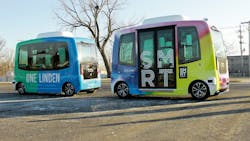Slight deviation in steering caused February sudden stop incident of Linden LEAP shuttle
A sudden stop of an autonomous vehicle in Ohio on Feb. 20 was caused by a slight deviation in the steering of the vehicle, according to Smart Columbus, which operates the shuttle.
The Linden LEAP vehicle was traveling at 7.1 miles per hour at the time of the sudden stop and caused a passenger to fall to the floor. The National Highway Traffic Safety Administration suspended the Linden LEAP and several other EasyMile autonomous shuttles because of the incident. EasyMile received clearance to restart autonomous shuttle operations in the United States last week.
Smart Columbus explains sudden stops in autonomous vehicles can be caused by many factors, including those that are not apparent to the eye, such as a small or unseen object in the vehicle’s path, weight distribution or road conditions.
While Smart Columbus is working with its partners to make adjustments to reduce sudden stops, they note these incidents cannot be eliminated entirely. However, additional safety enhancements that include seatbelts and passenger instruction will be implemented on the shuttles.
“With these enhancements, every passenger can be confident we’ve done everything in our power to ensure their ride is safe,” said Smart Columbus.
Even with the added safety precautions, Smart Columbus and the Linden LEAP project face another challenge: COVID-19. The Linden LEAP’s local operator, EmpowerBus, ceased business operations because of COVID-19 impacts and a new local operator will need to be brought onboard before Linden LEAP shuttles return to service.
“Smart Columbus will follow guidelines set forth by the state and city regarding COVID-19 and those impacts on the Linden LEAP’s return to service. We will be regularly assessing based on the current state of affairs when it is prudent to return to service and continue piloting self-driving technology in a neighborhood to connect Linden residents to needed community resources. The safety of our passengers and the public will continue to be our top priority,” said Smart Columbus.
About the Author

Mischa Wanek-Libman
Group Editorial Director
Mischa Wanek-Libman is director of communications with Transdev North America. She has more than 20 years of experience working in the transportation industry covering construction projects, engineering challenges, transit and rail operations and best practices.
Wanek-Libman has held top editorial positions at freight rail and public transportation business-to-business publications including as editor-in-chief and editorial director of Mass Transit from 2018-2024. She has been recognized for editorial excellence through her individual work, as well as for collaborative content.
She is an active member of the American Public Transportation Association's Marketing and Communications Committee and served 14 years as a Board Observer on the National Railroad Construction and Maintenance Association (NRC) Board of Directors.
She is a graduate of Drake University in Des Moines, Iowa, where she earned a Bachelor of Arts degree in Journalism and Mass Communication.
